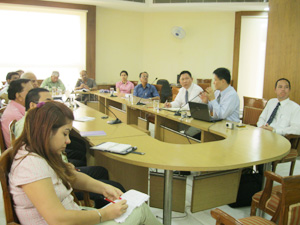A Taiwanese delegation visited Vivekananda International Foundation on 18 May 2012 to hold a Round Table Discussion on “Implications of the likely Leadership Change(s) in the PRC and PLA Strategy on the South China Sea Issue”. The delegation comprised of Dr. Cheng-kun Ma, Professor and Director of PLA Studies Division, National Defense University (NDU), ROC (Taiwan), Major James Peng, Instructor of National Defense University, Taiwan and Col. Hui-shin Chen, Director, Defence Division of Taipei Economic and Cultural Center (India).
At the outset, a comprehensive presentation was made by Dr. Cheng-kun Ma who started by explaining the dynamics of power structure and power transition in China, as well as the representation and influence of military personnel in the CPC Central Committee. During the course of power transition plenary sessions are held by the CPC Central Committee. The importance of the 7th one was noted as it would be followed by the 18th CPC Party National Assembly. He elaborated on the three important mobilisations that were initiated by the Communist Party during the 6th Plenary Session (that was held last year). They are 1) Ideological/Loyalty Mobilisation during which the cadres are sent to the localities and the local party members are asked to show their loyalty and reach consensus with the Central Party leadership about the power transition arrangement (for the 18th Party National Assembly) 2) Political Mobilisation in which the Prime Ministers produces a report for the National Assembly 3) Organisational Mobilisation through which they produce party representatives to participate in the national assembly, it includes people from a) Provincial level Party Organisation, b) Central Financial Institutions c) State owned Enterprises and d) PLA- Military.
 He also touched on the issue of representation and influence of military personnel in the political sphere of China. It was stated that the Communist Party has absolute leadership over the military and it has no significant authority in the power transition and political decision making, as the army occupies a small percentage of seats in the Party National assembly (they occupy roughly 1/10th of the seats in the 17th National Assembly).
He also touched on the issue of representation and influence of military personnel in the political sphere of China. It was stated that the Communist Party has absolute leadership over the military and it has no significant authority in the power transition and political decision making, as the army occupies a small percentage of seats in the Party National assembly (they occupy roughly 1/10th of the seats in the 17th National Assembly).
The presence of different factions namely Communist Youth League, Shanghai Gang and the Prince-lings and their leaders were brought out, as well as the delicate power balance arrangement between them was highlighted. It was also noted by Dr Ma that although the Central Committee makes political decisions about how many members would they have for the next party assembly however the different factions within it exert their influence in the decision making process depending on their power at that time. He also elaborated on the role and power of the nine members of the Standing Committee who form the core leadership in the political hierarchy of China.
He further spoke about the issue of the Crisis in the South China Sea highlighting the Scarborough Shoal Confrontation between China and the Philippines as well as bringing out the PLA strategy on the matter. He pointed out that China was insisting on absolute sovereignty over the shoal and were pushing for bilateral negotiations instead of multilateral dialogue. It was mentioned that while China persisted on a diplomatic solution to the confrontation it was preparing for an armed conflict. But Dr Ma noted that China does not intend to initiate a military confrontation and is just putting pressure on the other side in order to solve the issue before the Typhoon season (June- September) arrives and has to pull back from the region. Finally, he mentioned about the US warning to Philippines to refrain from doing anything provocative that could further lead to escalation of tensions between the two as China has made its intentions clear to the US over the crisis in the South China Sea.
Report prepared by Neha Mehta







